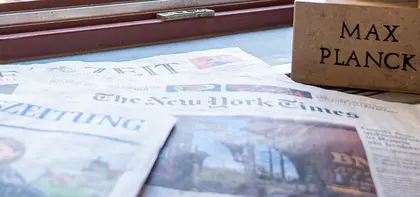Primary Place to Work – In Conversation with NSF Fellow Peter Morfe
Published Jan 22, 2024

Published Jan 22, 2024
Peter Morfe earned one of the most prestigious sciences awards worldwide, a Postdoctoral Research Fellowship from the American National Science Foundation NSF. He chose our institute to be the best place for his research project on “Degenerate, anisotropic elliptic and parabolic partial differential equations”.
The purpose of the Mathematical Sciences Postdoctoral Research Fellowships of NSF is to support future leaders in mathematics and statistics by facilitating their participation in postdoctoral research environments that will have maximal impact on their future scientific development. Peter expects his research stay at our institute under mentorship of Felix Otto to have a great impact on his research and his future scientific career. He especially appreciates the open atmosphere at the institute and the exchange with the scientists on site.
We have interviewed Peter to get some closer insights into his work and life here in Leipzig.
The impetus to move to the MPI came from my adviser, Takis Souganidis, who suggested I ask Felix Otto to sponsor me for the NSF fellowship. My main area of research is the analysis of elliptic and parabolic partial differential equations, with particular expertise in the theories of homogenization and viscosity solutions. Felix Otto has made major contributions over the past ten to fifteen years in homogenization theory, so that's an immediate overlap between our research interests. Some of my thesis research drew connections between gradient flows, homogenization, and statistical mechanics, which also ties in nicely with multiple focus areas of Otto's group.
Working at MPI is basically like my dream job. When I was an undergraduate, my mother asked what I thought I would be doing as a math professor, and I replied, "Going to the library and doing research." Indeed, today I very much enjoy reading and working on math problems at MPI's library.
I became interested in mathematics as a means of describing the universe. As far as an interest in science is concerned, the first inspiration I can remember came from a chemistry class, where the professor was describing, in vaguely mathematical terms, the kinetic theory of gases. The idea that math can explain how the interaction of atomic particles gives rise to macroscopic physics still fascinates me.
Today curiosity is still the biggest motivating factor for me. There is a huge amount of beautiful mathematics out there that combines elements of physics, analysis, and probability, the subjects I enjoy the most, and the prospect of slowly learning it and contributing to it is tantalizing to say the least.
It remains to be seen! It's a special time in my life, that's for sure. I was always fascinated by European history as a kid and dreamt of living there, so getting to live in Germany is a huge milestone for me personally. In terms of career, my hope is the time at MPI will help define my career going forward --- for instance, which problems I'll work on, who I'll collaborate with.
I enjoy reading and writing in general. Reading a book is really calming. Lately, I'm drawn to nonfiction, especially history. The history of quantum mechanics in particular is a subject I keep coming back to. It’s fun discovering the lives of the people behind the science. I'm slowly reading a biography of Max Planck at the moment, and after that I would like to learn more about the life of Boltzmann.
I'm captivated by the architecture. For instance, across from the institute there is a building that I was told is from the turn of the 19th century that I rather like. Of course, the Neues Rathaus is from the same period and it's such a statement in itself. I'm really curious to learn about the architecture from around that time in German history. I find it very distinctive.
Being at the MPI is an opportunity to broaden the scope of my research and start new collaborations. So far, I have learned a lot working with Felix Otto, and it's inspired me to start thinking about anomalous diffusion and turbulent transport. Through our seminar at MPI, I have gotten to meet a number of mathematicians in Europe. Quite possibly we will work together in the future, we have similar interests.
As far as accomplishments, the first goal is always learning more math and making progress on research problems. Specifically, I have two ongoing collaborations related to the homogenization of geometric flows --- it is starting to look like these will bear fruit soon. But I think I have to be careful about not getting too lost in my own research. I'm trying to be more aware of my colleagues' work and more open to the possibilities. There is a lot of activity related to stochastic partial differential equations, for instance, and I'm starting to realize it's a vital area of research with a lot to offer.
My plan is to continue pursuing an academic career. The ultimate goal is a tenured professorship at a research university. As far as the next step, a tenure-track assistant professorship in the US is my goal.
We wish you much succcess and all the best!
Peter Morfe's personal website
Information on the research group “Pattern Formation, Energy Landscapes and Scaling Laws”